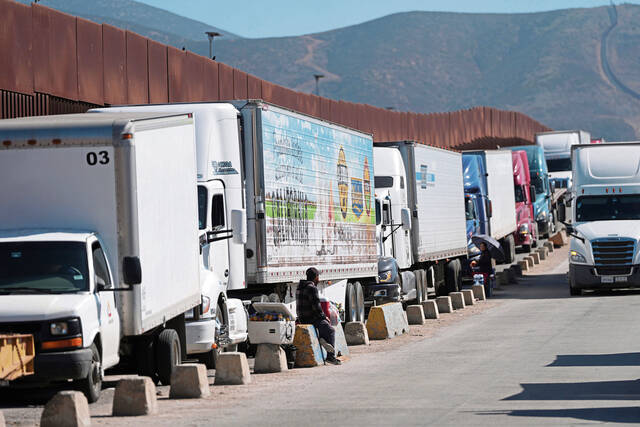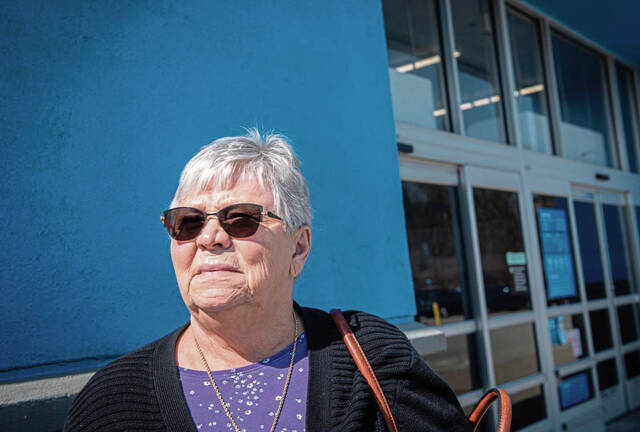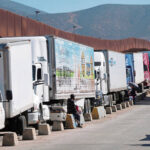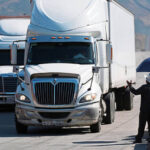Ami Robinson said she had been pinching pennies before President Donald Trump’s new tariffs against America’s three biggest trading partners took effect Tuesday.
“I think things were already more expensive than they were last year,” Robinson, 40, of Dormont said after leaving the Target store in Downtown Pittsburgh.
“It’s just a question now of how much higher are they going to go and what is something people will tolerate,” she added. “It’s going to get to a point where people can’t afford things anymore.”
Trump’s new tariffs resulted in immediate retaliatory tariffs from Mexico, Canada and China and rattled many U.S. consumers, business owners and investors.
Robinson said she has already cut back spending on items that aren’t necessities and opts for secondhand, cheaper options when possible. She doesn’t buy prepared foods anymore and is less likely to pay for pricier name brands when generic options are available. Rather than buying new toys for her son, she said, she sifts through listings on no-buy Facebook groups or swaps unused items with neighbors and relatives.
“We’re just buying less because we have to,” she said.
She said she’s worried the new tariffs could add to her grocery bill.
Some imported goods whose prices are expected to be hit first include gas, computers and other electronics, clothes, toys, homebuilding materials, Mexican avocados and popular alcoholic beverages such as tequila and Canadian whiskey.
Outside the Fine Wine & Good Spirits store in Downtown Pittsburgh, Jeannette Hickman, 55, of Point Breeze said she had considered stockpiling bottles of Canadian whiskey but opted to buy some vodka instead. She said she’s also concerned about the impact on avocado prices.
Unlike whiskey, Hickman said, “You can’t stockpile avocados.”
Hempfield’s Pat Hart, 83, who bought an avocado and some tomato sauce Tuesday at the Shop ’n Save store on North Main Street in Greensburg, said she’s already seen her grocery expenses double because of inflation and is worried that tariffs could drive them up more.
“But what can you do about it?” said her husband, Tom, 85.
Apparently, a little.
Tom Hart said he topped off their car’s gas tank Tuesday in advance of the new tariffs taking effect, to avoid a potential price jump at the pump for at least one tankful. And while many fresh tomatoes are imported from Mexico, Pat Hart said she isn’t overly concerned about their cost potentially going up — at least, not for this summer.
“I like to garden, so in the summer that won’t be a problem,” she said. “(Tom) will only eat homegrown tomatoes.”
Business impact
Auto prices also could be impacted, as auto companies have built supply chains that cross the borders of the United States, Mexico and Canada.
More than one in five of the cars and light trucks sold in the United States were built in Canada or Mexico, according to S&P Global Mobility.
Last year, the U.S. imported $79 billion worth of cars and light trucks from Mexico — far more than any other country — and $31 billion worth from Canada. Another $81 billion in auto parts came from Mexico, $19 billion from Canada and $18 billion from China.
The new 25% tariff on Canadian softwood lumber used in construction is in addition to a 14.5% duty rate already in place, according to the National Association of Home Builders. About a third of the softwood lumber used in the United States is imported from Canada.
“These tariffs are going to be a disaster,” said Daniel Durden, CEO of the Harrisburg-based Pennsylvania Builders Association.
Durden said the American market does not produce enough lumber to meet demand because it does not have the mill capacity. So even if more trees were cut down in the state of Washington, for example, much of that might need to be shipped across the border to mills in British Columbia and then transported back across the border, possibly with tariffs slapped on, Durden said.
In addition to wood from Canada, Mexico is the United States’ biggest source of raw gypsum, the main ingredient in drywall used in construction, Durden said.
If the cost of those major components goes up, contractors could raise their prices. That, in turn, could cool demand from prospective homebuyers, Durden said. If that happens, contractors wouldn’t need as many laborers and jobs could be lost, he said.
Target’s CEO said Tuesday that the company could raise prices in coming days in response to tariffs, while Best Buy’s chief executive warned that price increases are “highly likely,” according to NBC News. Walmart also has said that it’s “not going to be completely immune” from the impact of tariffs, NBC News reported last month.
Wall Street reacted immediately — and adversely — to the tariffs taking effect. The S&P 500 dropped 0.7% Tuesday morning, the Nasdaq fell 0.6% and the Dow slid 423 points, or 1%.
When the markets closed, the S&P was down about 1.2% for the day, the Nasdaq had fallen 0.4% and the Down dropped nearly 1.6%.
Markets in Europe also fell sharply, while stocks in Asia saw more modest declines.
Recent polling has signaled consumer concern about inflation and the economy.
A CBS/YouGov poll published this week showed at least 80% of those surveyed said Trump should make dealing with the economy and inflation a high priority, tops among all issues, but 36% said they feel Trump is prioritizing the economy “a lot,” compared with 29% for inflation.
A Reuters/Ipsos poll, released last week, showed 20% of those surveyed feel the country is headed in the right direction as far as their cost of living, compared with 64% who feel it is on the wrong track.
‘In a hard place’
Judy Williams, 62, of Penn Township thinks the country is on the right track under Trump.
“I think in the long run (tariffs are) going to help lower prices and stabilize our government,” she said. “He’s done a good job in the past.”
Her husband, Bobby, 56, agreed.
“We gave Biden a chance, now give Trump a chance,” he said. “You’ve got to give it time.”
Nicole Lojak, 41, of Fawn said she isn’t sure what to make of the tariffs. With her family including both Democrats and Republicans, she said she gets conflicting accounts of how tariffs will impact the economy and her own pocketbook.
“I don’t know how to feel about it,” Lojak said.
Tim Mietzner, 66, of Pittsburgh’s Highland Park said he thinks the tariffs are “going to be a disaster” for the economy and consumers.
“I think we’re making a lot of enemies,” he said at the Target store in Hempfield.
Patricia Mastic, 74, of the Natrona Heights section of Harrison, said she and her husband are accustomed to watching their spending as retirees on fixed incomes.
While Mastic said she’s concerned about tariffs further driving up prices on groceries, she added, “We’re going to roll with the punches. There’s nothing else we can do … We’re stuck like everybody else in a hard place.”
The Associated Press contributed.





















